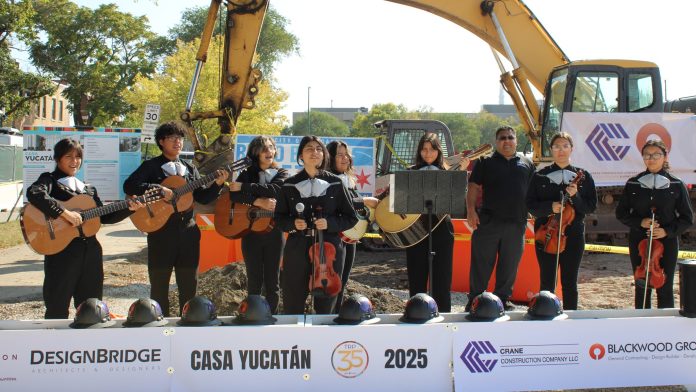Chicago Construction News staff writer
Construction has officially begun on Casa Yucatán, a new affordable housing development in the Pilsen neighborhood that will provide 98 rental homes for families and individuals. The project is a major milestone in the city’s efforts to expand access to affordable housing while preserving the neighborhood’s diverse community.
Casa Yucatán will offer units for households earning 30% to 70% of the Area Median Income (AMI), with monthly rents ranging from $551 to $1,768. The development received $15.8 million in financing and capital support from the city’s Housing and Economic Development (HED) Bond, marking the first of several affordable housing projects to move forward with this funding.
Located at 2134-2136 S. Ashland Ave., the eight-story, elevator-serviced building will feature mixed-income, mixed-use housing. The development will include 38 one-bedroom units, 34 two-bedroom units, and 26 three-bedroom units, along with 2,500 square feet of community space that will host a multipurpose room, a training center, and a mailroom. On-site management, laundry facilities, and storage will also be available.
The project transforms a long-vacant lot into a vibrant community hub and ensures that residents have access to local schools, including Benito Juarez High School and Cooper Dual Language Academy, as well as public transit via the CTA Pink Line.
Key partners behind the project include:
-
Design and construction: DesignBridge, Crane Construction Company LLC, Blackwood Group LLC
-
Financial supporters: CIBC, Enterprise Community Partners, ComEd, and the Federal Home Loan Bank
Casa Yucatán is led by The Resurrection Project, which is celebrating its 35th anniversary this year. The organization has a long history of providing affordable housing, creating community wealth, and serving as a steward for Southwest Side neighborhoods.
The development is part of the broader Build Better Together initiative, which aims to address Chicago’s housing challenges, preserve cultural heritage, and provide equitable housing opportunities in communities across the city. The project is expected to contribute to the economic vitality and long-term sustainability of the Pilsen neighborhood.






